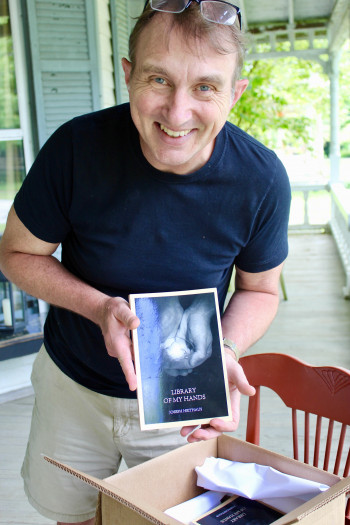
Sitting under the sun on a Friday morning, English professor Joe Heithaus took notice of the sweetgum tree in front of the Memorial Student Union Building. He talked to a first-year about the magic scent of the leaves, as well as the art of poetry. “Poetry has a way of allowing humans to look at things and explore the things around them,” Heithaus said.
Heithaus sent out ten sonnet poems inspired by poisoned plants that he started writing around the turn of the century, and which eventually won the prestigious Discovery/The Nation Prize. The prize came with his first book, “Poison Sonnets,” published in January 2012.
Heithaus has been given many other opportunities that he described as “weird.” “I have a poem edged in glass in the Indianapolis airport, a poem in a barn on the west side of town…There are some odd ways that my poems found the world without me pushing really hard and certain things just happened,” Heithaus said.
His most recent book that was published in 2020, “Library of My Hands,” dedicated to his wife and children, was introduced to DePauw in the recent Kelly Writers Series event. The book was designed and executed by DePauw art professors Cindy O’Dell and Jerry Bates, which makes it more special to our community.
O’Dell shared her collaboration with the two colleagues when she said, “I loved assisting Jerry Bates in developing his vision for the cover of Joe’s new book of poetry. Jerry had a vision of what he wanted the cover photo to look like and I tried to create a photograph that matched his vision.” The cover of the book was Heithaus’ hand holding water in a flashlight, the process of which O’Dell described as “a bit chaotic, but very fun.”
“It was a collaborative and creative experience––poet, photographer and painter. I am always honored to be around such gifted artists. Joe is a gifted and prolific writer and one of the best teachers I know,” O’Dell added.
The title of the book, to Heithaus, was a way to collect a lot of poems that have been published in little journals here and there, but have never seen the light of day as a group.
To Heithaus, writing poetry is a way for him to interact with the world. “Poetry doesn’t have a rhythm, it could be almost everything I want it to be, that opens a world for me. Since I got older, I realized that everything feeds poetry,” Heithaus said.
Heithaus shared how he perceived the world around him with dedication and a simple mind. “I’m just sitting outside, and I’m looking at a sweetgum tree, and I know if I just pull down one of the leaves, I can cut it open and it would have this fabulously interesting smell. I think if I was not a poet, I would not be interested enough to read, to learn that, or to do it,” Heithaus said.
Writing in some form is a part of his daily routine. “I will try to write everyday. I will write before I go to bed, I will make sure that there is something in the journal,” Heithaus said. “But I think, sometimes, I did write poems. I think out of the discipline of writing everyday, I wrote things that, at the time, seemed really profound or gave me some insight.”
Heithaus said he wants to write more about the devastation of the planet, the deaths of species, the relationship with the environment, who people are in terms of their race, and how humans perceive themselves. Poetry is still opening new worlds for Heithaus to discover despite his long career in writing.
“I feel like poetry is a way, almost in every given day, by reading a poem, trying to write a poem, trying to think poetically, the world opens up just like a little door. You open a door every once in a while by reading poems and seeing someone else’s experiences, which allows you to notice something as silly as a leaf,” Heithaus added.
According to Heithaus, writers are supposed to make us aware of who we are and what structures hold us in place. “I think writers have a role in opening our minds and eyes to the injustices around us, and how all those injustices are connected to history. The world is a damn mess and we have the responsibility to at least pick up some small parts of it, delight in what we can but to also write at least without awareness,” Heithaus said.
